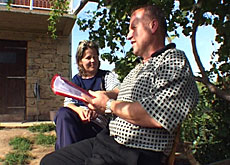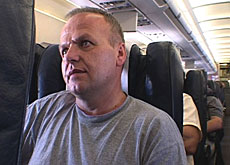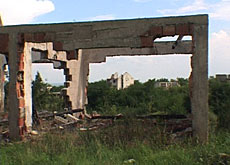Return to Kosovo

As the Swiss prepare to vote on whether to tighten the country's asylum laws, swissinfo followed a Serbian Kosovar on his journey home.
In the second of a three-part series, Julie Hunt accompanies refugee Zoran Stojanovic to his village in Kosovo.
Zoran Stojanovic looks nervous as the plane touches down at Pristina Airport.
He has taken the bold decision to relinquish his claim for refugee status in Switzerland and is on his way home to Kosovo under the Swiss government’s voluntary repatriation programme.
He has been given SFr2,000 ($1,380) and a one-way plane ticket, and assured that it is now safe for him in his hometown of Gnilane/Gjilan.
But Zoran is having serious reservations. There are a lot of ethnic Albanians who do not welcome the return of Serbs to the troubled province.
IOM chaperone
As part of the repatriation package, Zoran is met at the airport by representatives from the International Organization for Migration. He doesn’t even have to pass through passport control.
IOM project officer Amr Taha shakes his hand heartily as he steps off the plane onto the rain-soaked tarmac and leads him to a four-wheel drive car where Zoran’s bags are safely stowed away.
We crawl through the traffic jams around the sprawling capital, Pristina, and make our way along deeply-pitted and neglected roads towards Zoran’s village of Pones, some 40 minutes drive away.
The journey home
The idyllic countryside, dotted with cottages and cows, belies the deep turmoil Kosovo continues to suffer.
We pass a reservoir that is supposed to supply the central area of the province but is now almost dried up.
Sporadic water and electricity supplies are just a few of the many problems Kosovo is facing in its sluggish moves towards democracy.
We arrive at a large, tidy, three-storey house. In the garden, vines drape lazily over a trellis, providing welcome shade for family meals on balmy, sunny days.
Hens and pigs busy themselves in their respective enclosures at the end of the yard. Behind them, vegetables grow in tidy rows in a field – provisions for the winter.
The village is split in two, with Serbs living on one side and Albanians on the other. The houses seem to have escaped the bombardments of the war of three years ago.
Family reunion
Zoran’s two daughters and son come running out to meet him and there are rapturous embraces.
His wife waits patiently in the doorway for her modest kiss on the cheek. Zoran has been away for 18 months.
The family has suffered hardship, fear and uncertainty in his absence.
One by one, additional family members – all living in the same village – pour into the Stojanovic dining room.
There is mother in her traditional Serb black dress and headscarf, father – a weathered and embittered farmer – two brothers, their wives and children.
All are blue-eyed and fair-skinned. There is no mistaking these ethnic Serbs for Albanians.
Zoran seeks work
Two days later, the IOM return to Zoran’s house and take him to their local office in Gjilane/Gnilane. They interview him and take down details of his qualifications and work preferences.
Zoran tells them he wants to resume his former position as director of the local school in Pones.
He is told that if he can get a certificate from the Serb government proving that he was director up until January 2001, he can have his old job back.
Despite these positive developments, Zoran is disappointed at the continuing anti-Serb atmosphere he encounters on his return to Kosovo.
“There are 40,000 Serbs around here and not one of them has a job. So there’s obviously a problem.”
Pessimism
He maintains that the international organisations give preference to Albanians.
“They don’t bother about the Serbs. We have no access to jobs, medical treatment, social services. Our basic human rights are not guaranteed. But the Albanians have all these rights.”
Lorena Lando, head of the Gjilan/Gnilane office of the IOM, denies that the Albanians are being singled out for preferential treatment, as far as the labour market is concerned.
“I don’t think that anybody is in a privileged position, per se. The unemployment rate in Kosovo is really high.
“But we do have some funding from Switzerland where returnees can set up businesses. That will help create employment and stability”.
I ask Zoran what he feels his prospects are for the future. “We would like to stay here, if we can find jobs – my wife and I.
“We were born here and this is our home. We do have some land to cultivate but we can’t survive without jobs.”
swissinfo, Julie Hunt
3,200 members of Kosovar minority groups are seeking asylum in Switzerland.
189 of these are Serbs.
Only eight Serbs have gone home under the Voluntary Return Programme.
By May 2003, Kosovar minorities still in Switzerland will either be given asylum or forced to return home without financial help.
A series on the return home to Kosovo of Zoran Stojanovic, an ethnic Serb.
He sought asylum in Switzerland, after escaping a revenge campaign by Albanian victims of Serb ethnic cleansing.
Now the Swiss authorities have told him it is safe to return. But without work, it is going to be difficult to stay in Kosovo.

In compliance with the JTI standards
More: SWI swissinfo.ch certified by the Journalism Trust Initiative












You can find an overview of ongoing debates with our journalists here . Please join us!
If you want to start a conversation about a topic raised in this article or want to report factual errors, email us at english@swissinfo.ch.